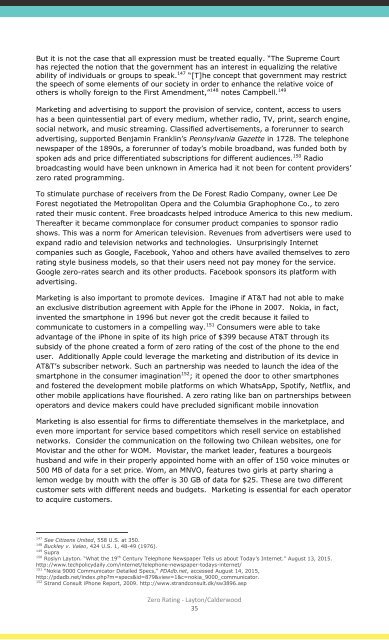Layton
Layton
Layton
Create successful ePaper yourself
Turn your PDF publications into a flip-book with our unique Google optimized e-Paper software.
But it is not the case that all expression must be treated equally. “The Supreme Court<br />
has rejected the notion that the government has an interest in equalizing the relative<br />
ability of individuals or groups to speak. 147 “[T]he concept that government may restrict<br />
the speech of some elements of our society in order to enhance the relative voice of<br />
others is wholly foreign to the First Amendment,” 148 notes Campbell. 149<br />
Marketing and advertising to support the provision of service, content, access to users<br />
has a been quintessential part of every medium, whether radio, TV, print, search engine,<br />
social network, and music streaming. Classified advertisements, a forerunner to search<br />
advertising, supported Benjamin Franklin’s Pennsylvania Gazette in 1728. The telephone<br />
newspaper of the 1890s, a forerunner of today’s mobile broadband, was funded both by<br />
spoken ads and price differentiated subscriptions for different audiences. 150 Radio<br />
broadcasting would have been unknown in America had it not been for content providers’<br />
zero rated programming.<br />
To stimulate purchase of receivers from the De Forest Radio Company, owner Lee De<br />
Forest negotiated the Metropolitan Opera and the Columbia Graphophone Co., to zero<br />
rated their music content. Free broadcasts helped introduce America to this new medium.<br />
Thereafter it became commonplace for consumer product companies to sponsor radio<br />
shows. This was a norm for American television. Revenues from advertisers were used to<br />
expand radio and television networks and technologies. Unsurprisingly Internet<br />
companies such as Google, Facebook, Yahoo and others have availed themselves to zero<br />
rating style business models, so that their users need not pay money for the service.<br />
Google zero-rates search and its other products. Facebook sponsors its platform with<br />
advertising.<br />
Marketing is also important to promote devices. Imagine if AT&T had not able to make<br />
an exclusive distribution agreement with Apple for the iPhone in 2007. Nokia, in fact,<br />
invented the smartphone in 1996 but never got the credit because it failed to<br />
communicate to customers in a compelling way. 151 Consumers were able to take<br />
advantage of the iPhone in spite of its high price of $399 because AT&T through its<br />
subsidy of the phone created a form of zero rating of the cost of the phone to the end<br />
user. Additionally Apple could leverage the marketing and distribution of its device in<br />
AT&T’s subscriber network. Such an partnership was needed to launch the idea of the<br />
smartphone in the consumer imagination 152 ; it opened the door to other smartphones<br />
and fostered the development mobile platforms on which WhatsApp, Spotify, Netflix, and<br />
other mobile applications have flourished. A zero rating like ban on partnerships between<br />
operators and device makers could have precluded significant mobile innovation<br />
Marketing is also essential for firms to differentiate themselves in the marketplace, and<br />
even more important for service based competitors which resell service on established<br />
networks. Consider the communication on the following two Chilean websites, one for<br />
Movistar and the other for WOM. Movistar, the market leader, features a bourgeois<br />
husband and wife in their properly appointed home with an offer of 150 voice minutes or<br />
500 MB of data for a set price. Wom, an MNVO, features two girls at party sharing a<br />
lemon wedge by mouth with the offer is 30 GB of data for $25. These are two different<br />
customer sets with different needs and budgets. Marketing is essential for each operator<br />
to acquire customers.<br />
147 See Citizens United, 558 U.S. at 350.<br />
148 Buckley v. Valeo, 424 U.S. 1, 48-49 (1976).<br />
149 Supra<br />
150 Roslyn <strong>Layton</strong>. “What the 19 th Century Telephone Newspaper Tells us about Today’s Internet.” August 13, 2015.<br />
http://www.techpolicydaily.com/internet/telephone-newspaper-todays-internet/<br />
151 “Nokia 9000 Communicator Detailed Specs,” PDAdb.net, accessed August 14, 2015,<br />
http://pdadb.net/index.php?m=specs&id=879&view=1&c=nokia_9000_communicator.<br />
152 Strand Consult iPhone Report, 2009. http://www.strandconsult.dk/sw3896.asp<br />
Zero Rating - <strong>Layton</strong>/Calderwood<br />
35


